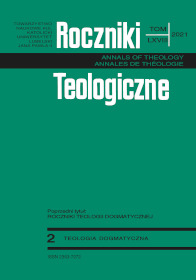The Relationship between Theology and Law on the Basis of the Encyclical Pacem in terris of John XXIII
Abstract
The above research permits one to draw legal and theological conclusions. The first sub-point, presenting the legal value and social-political context of the papal teaching, permits the creation of a foundation for the following theological considerations. The second subpoint permits for the separation of the theology of the encyclical and its meaning for the whole document. The last sub-point reveals in what way the legal and theological elements intersect in the encyclical’s text and what consequences this has for ecclesiology and the methodology of research at the intersection of theology and law. This article presented many mutual points of reference for theology and law and emphasized their methodological and substantive autonomy. The encyclical Pacem in terris of John XXIII is a creative proposal for the cooperation between theology and law, in which the Pope follows the principle of efficacy, which is the desire that the catalogue created by him is not only theoretical but also actually used. His teaching focuses on the theme of peace, which seems to assume the meaning that has already placed on justice, and the Pope seems to make it the centre of all international relations. That, in turn, allows to distinguish peace as a clearly legal category and so decisive for the just character of law itself. Because of the connection between peace, God’s order and Christ’s mission, there is a perfect intersection between temporal matters regulated by law and supernatural ones, which are the subject of theology. There exist two alternative models of the unity of humankind: the natural and the ecclesial. They have a complementary character as the two paths leading to a common goal and take the form of attaining the commonly desired peace on earth and the unification of humanity in Christ, who is peace himself. The Pope uses legal language, which has characteristics manifesting the openness of theology to law and vice-versa. Among them are cognitive realism, universal concepts, universal themes, social efficacy, legal naturalism, and mutual inspiration.
References
Jan XXIII. Encyclical Pacem in terris on Establishing Universal Peace in Truth, Justice, Charity, and Liberty. April 11, 1963. http://www.vatican.va/content/john-xxiii/en/encyclicals/documents/hf_j-xxiii_enc_11041963_pacem.html.
Karta Narodów Zjednoczonych [Charter of the United Nations]. Accessed June 8, 2020. https://sip-1lex-1pl-1000019oh351e.buhan.kul.pl/#/act/16779385/8469/karta-narodow-zjednoczonych-statut-miedzynarodowego-trybunalu-sprawiedliwosci-i-porozumienie...?keyword=Karta%20Narod%C3%B3w%20Zjednoczonych&cm=SFIRST.
Kelly, John N.D. Encyklopedia papieży. Translated by Tadeusz Szafrański. Warszawa: Państwowy Instytut Wydawniczy, 2006.
Lusawa, Roman. “Encyklika ‘Pacem in terris’ – głos Kościoła katolickiego w sprawie pokoju z 11 kwietnia 1963 roku.” Rocznik Naukowy Wydziału Zarządzania w Ciechanowie 4, no. 1-4 (2010): 103-18.
Majka, Józef. “Komentarz do encykliki Jana XXIII ‘Pacem in terris.’” In Jan XXIII. Pacem in terris, 77-87. Wrocław: Wydawnictwo Archidiecezjalne, 1997.
Powszechna Deklaracja Praw Człowieka [Universal Declaration of Human Rights]. Accessed June 8, 2020. https://www.unesco.pl/fileadmin/user_upload/pdf/Powszechna_Deklaracja_Praw_Czlowieka.pdf
Sobański, Remigiusz. Nauki podstawowe prawa kanonicznego. Vol. 2. Teologia prawa kościelnego. Warszawa: Wydawnictwo Uniwersytetu Kardynała Stefana Wyszyńskiego, 2001.
Sobański, Remigiusz. Nauki podstawowe prawa kanonicznego. Vol. 2. Teologia prawa kościelnego. Warszawa: Wydawnictwo Uniwersytetu Kardynała Stefana Wyszyńskiego, 2001.
Strzeszewski, Czesław. Katolicka nauka społeczna. Warszawa: Wydawnictwo ODiSS, 1985.
Wołodkiewicz, Witold. “‘Ius et lex’ w rzymskiej tradycji prawnej.” Ius et Lex no. 1 (2002): 51-61.
Copyright (c) 2021 Roczniki Teologiczne

This work is licensed under a Creative Commons Attribution-NonCommercial-NoDerivatives 4.0 International License.





